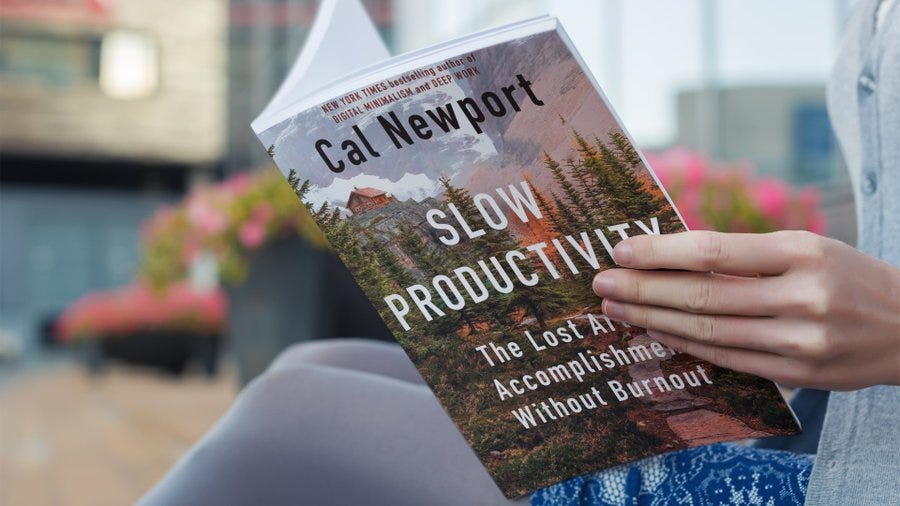
There seems to be a trend online since the pandemic. People are parting ways with hustle culture and looking for a more sustainable and enjoyable approach to productivity. I’m all for it.
That’s why, after the success of recent books such as Celeste Headlee’s Do Nothing, Anne Helen Petersen’s Can’t Even, Devon Price’s Laziness Does Not Exist, and Oliver Burkeman’s Four Thousand Weeks, I was not surprised when I read the title of Cal Newport’s latest book.
I was more than surprised though while reading it at the small quantity of actionable advice and the amount and length of its stories. This is not a how-to book.
The pillars of slow productivity
According to Cal Newport, three underlying principles form his concept of slow productivity :
Do fewer things
Work at a natural pace
Obsess over quality
And that’s, in essence, the whole book summed up in 3 bullet points.
All nice and dandy if you are a self-employed content creator, but not so easy to implement when you’re an office knowledge worker.
Quiet sabbaticals?
For those of us working in an office and reporting to a boss, Newport suggests that we take quiet breaks from work, without announcing it, by just reducing our work output for a month or two every few months. He says that reducing our commitments should go unnoticed, which I highly doubt. I’d think my boss would pop his head in my office in inquiry after the first week.
Work at a natural pace
Newport shares several examples of creatives who have produced high-quality work while working at a somewhat slow pace. It might be possible while you work on your thesis or if you receive grants or book advances, but for the laypeople, office work tends to be high-paced, with back-to-back meetings and looming deadlines. Once again, I found that his advice was targeted at a demographic that I wasn’t part of.
Obsess over quality
I do agree that in an ideal world, obsessing over quality should come before output and volume. In this information overload era, quality writing sets itself apart, in a sea of regurgitated, bland, AI-infused ideas. Producing quality work is something we should all aim for.
The Lost Art of Accomplishment Without Burnout
When I first preordered the book, I had high hopes based on its tagline. Sadly, it did not deliver any actionable ways to avoid burnout as a professional. For me, this one missed the mark.
At 244 pages, it’s a reasonably quick read, and I would have expected more value and fewer stories that seemed like fluff to me.
Focus on his previous books
If you want to read great Cal Newport works, focus on his previous books such as Deep Work, which should be mandatory reading for any knowledge worker in my opinion, and Digital Minimalism, which helps a great deal with information overload.
But I think you can skip Slow Productivity. You get the gist from the 3 bullet points above.
What’s one book you were excited about that did not deliver on your expectations? Let me know in the comments below!
This article contains affiliate links. If you use one of my links and make a purchase, I will get a small commission at no cost to you, which helps fund this free Substack. Thanks for your support!




Ooh, interesting. Thank you. I have Digital Minimalism on my TBR pile and I'm looking forward to reading that, having read some very variable reviews on it. I appreciate your bullet points on this one though. I find that a lot of "slow productivity" do only tend to be applicable to a very narrow demographic. Add in a busy family or a long commute for example and the whole premise seems to go out of the window.